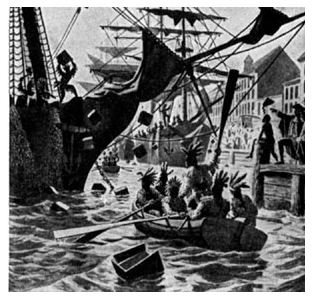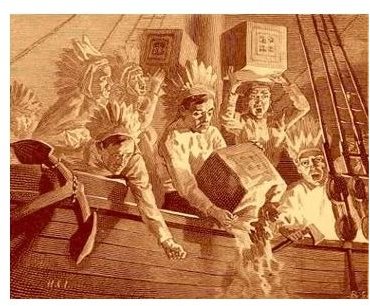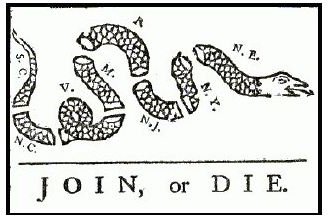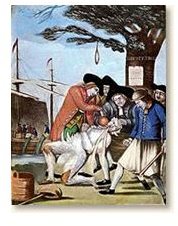History Lesson Plan About the Boston Tea Party
Background
The Boston Tea Party was a colonial demonstration and act of vandalism to protest the Tea Act of 1773. The Tea Act was essentially a government bailout for the cash-strapped East India Company, which actually could have resulted in lower tea prices to the colonial consumer. Under the Act, the East India Company could sell its tea in American ports (without shipping through Great Britain) and the Company was exempt from British tea import taxes.
What the British Government under Lord North did not foresee was American merchant resentment towards an unfair tax break to a company that already had a monopoly on tea imports. Also, there was the symbolic and long-term resentment in the colonies over Britain’s arbitrary trade and mercantile restrictions.
Colonial Reaction to the Tea Act
Many colonists, urged by their local merchants, responded to the Tea Act by boycotting tea.Colonial women, who were heavy tea drinkers, also lent a hand in this symbolic resistance to British taxation. A few colonies were able to keep East India Company ships from unloading their cargoes, and the local strong-arm tactics and pressure even forced some of the company agents to resign. A significant amount of the tea was sent back to England or warehoused unsold.
Boston, on the other hand, was somewhat of a different story. Port agents refused to resign and sought the protection of the Royal Governor. The company agents decided to to bring the tea ashore, regardless of local opposition.
Samuel Adams and the Boston Tea Party

On December 16, 1773, a group estimated to be between 30 and 130 men, some crudely disguised as Mohawk Indians, headed towards Boston Harbor. As agitated Boston citizens skulked around the docks where three ships laden with tea cargo were moored, the “Mohawks” boarded ships and in the course of three hours (without resistance by the ships’ captains), dumped over 300 chests (valued at about $2 million in today’s money) of tea into the harbor. Also, British ships that had been stationed in the harbor to prevent the merchants from leaving without offloading their cargo did nothing to interfere with the colonists.
Although it is doubtful that Samuel Adams (cousin of John Adams, future second President of the United States) participated directly in the dumping of the tea, he was definitely an instigator and later apologist for the deed. Here is what he said on the day of the Boston Tea Party:
“Fellow countrymen, we cannot afford to give a single inch! If we retreat now, everything we have done becomes useless! If (Governor) Hutchinson will not send tea back to England, perhaps we can brew a pot of it especially for him!”
British Reaction and Results of the Boston Tea Party

Outraged and determined not to let what they considered an act of rebellion and vandalism go unpunished, the British Government decided to get tough. The Parliament (even members who considered themselves friends of the colonists) united and passed a series of four laws that targeted the Bostonians. Known as the “Coercive Acts” (or “Intolerable Acts” by the colonists) these acts:
♦ Closed the Port of Boston until such time as the destroyed tea was paid for.
♦ Revoked the Massachusetts colony charter and restricted public assembly.
♦ Forced colonial civilians to house British soldiers.
♦ Allowed British officials accused of capital crimes to be tried outside the colonies.
♦ Placed Massachusetts under rigid British military control.
In sum, the aftermath of the Boston Tea Party was the British clampdown that further inspired united the colonies and accelerated the start of the American Revolution in 1775.
Classroom Activities/Suggested Discussion Areas

Discuss the following in class or as an essay assignment:
♦ Was the special treatment given to the British East Indian Company fair?
♦ The Tea Act did not actually result in raising taxes in the colonies. Why were the colonists so outraged?
♦ Was the destruction of the tea cargo in the holds of the merchant ships justified?
♦ What could have been done to prevent the destruction of the tea?
♦ Were the British measures to punish Massachusetts appropriate and fair?
♦ Would acts of vandalism such as the Boston Tea Party be appropriate or tolerated today? If so, give a hypothetical example; if not, state why not?
Resources and Further Reading
EyeWitness to History.com - The Boston Tea Party, 1773
U.S. History.com - The Coercive Acts
This post is part of the series: Causes of the American Revolution
The American Revolutionary War began with shots fired at Lexington and Corcord. The war was caused by a series of events that began after the French and Indian Wars. This series traces the beginnings of the rift between Great Britain and its American colonists that resulted in armed rebellion.
